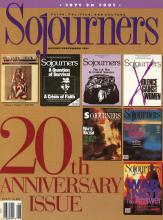I remember my reaction when I first beheld a copy of The Post-American. I was annoyed with William Stringfellow. Here was an underground theological rag of such kinship to the spirit and politics of our own little community in Battle Creek, Michigan that it took the breath away. These folks were lucid and literate. And they were located in Chicago, a day's short hitchhike down the road.
Moreover, here was Stringfellow's name on the masthead and his byline in the pages. Since he had already put us in touch with a raft of seminarians with regard to the idea of an "underground seminary," I suppose I thought it was his job to connect us or orchestrate a meeting; the barest mention would have sufficed.
And now they were taking to the road themselves, off to DC and the belly of the beast. Imperial center or bust. Eventually I did the longer hitch and presented myself at the office for lunch and talk. (The bust was several days later.)
In the gospel manner of the Way, we've been on the road together ever since. The New Testament term is right for Sojourners. The Way suggests direction, or better, a movement, invariably a counter-movement, as in "going another way" than prevailing religion, culture, or empire.
In 20 years Sojourners has become established as an embodied biblical voice from within that movement. I choose the words carefully. It was more than anything the "voice" which I recognized in that copy of The Post-American, a voice that has, over time, matured and deepened but with an abiding integrity. It remains the same voice. One which can call us and convene us and give form to the very thoughts of our own hearts. Such is the gift.
We all know there is a temptation in this as well, a hidden urge to be somehow the voice of the movement. In chorus and harmony, we best pray against that.
Read the Full Article

